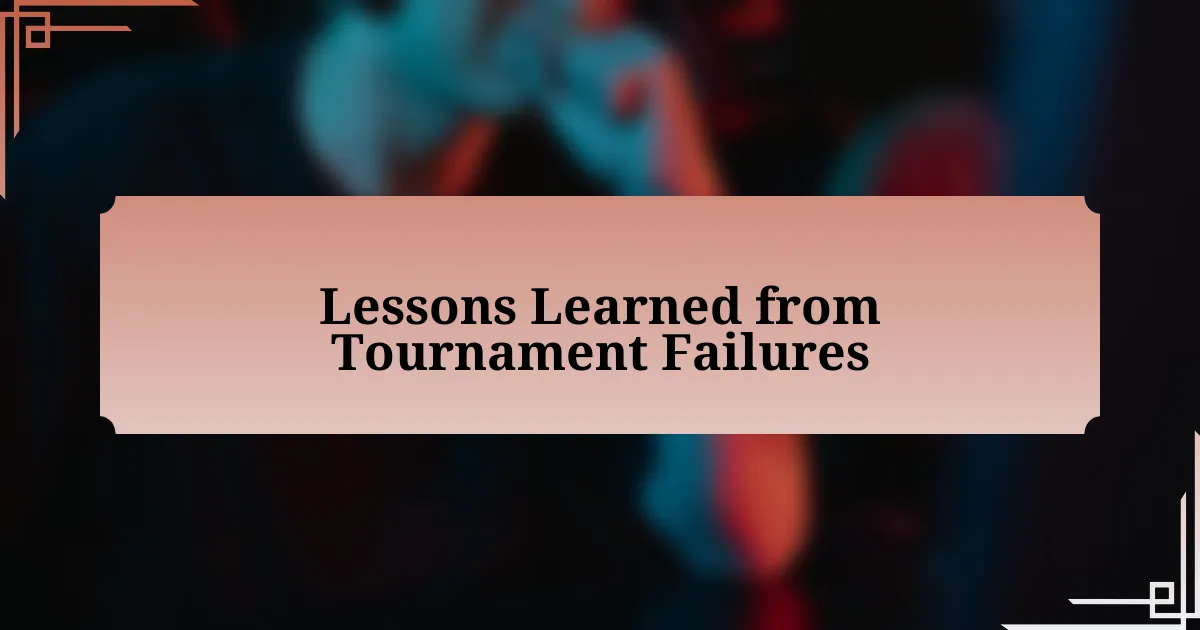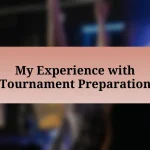Key takeaways:
- Clear communication and adaptability are critical for success in tournaments, as miscommunication and rigidity can lead to failure.
- Reflecting on past performances and setting realistic, incremental goals can foster improvement and accountability among team members.
- Embracing a growth mindset transforms setbacks into learning opportunities, encouraging teams to strategize and collaborate effectively.
- Implementing changes through regular practice and strategy workshops enhances skills and prepares teams for future challenges.
Author: Evelyn Hartley
Bio: Evelyn Hartley is an award-winning author known for her compelling narratives and richly drawn characters. With a background in psychology and literature, she weaves intricate tales that explore the complexities of human relationships and the intricacies of the human psyche. Her debut novel, “Whispers in the Dark,” was celebrated by critics and readers alike, earning her a dedicated following. Evelyn’s work has been featured in various literary journals and anthologies, and she frequently speaks at writing conferences and workshops. When she’s not writing, she enjoys hiking in the mountains and volunteering at her local animal shelter. She resides in Seattle with her two rescue dogs, Luna and Milo.
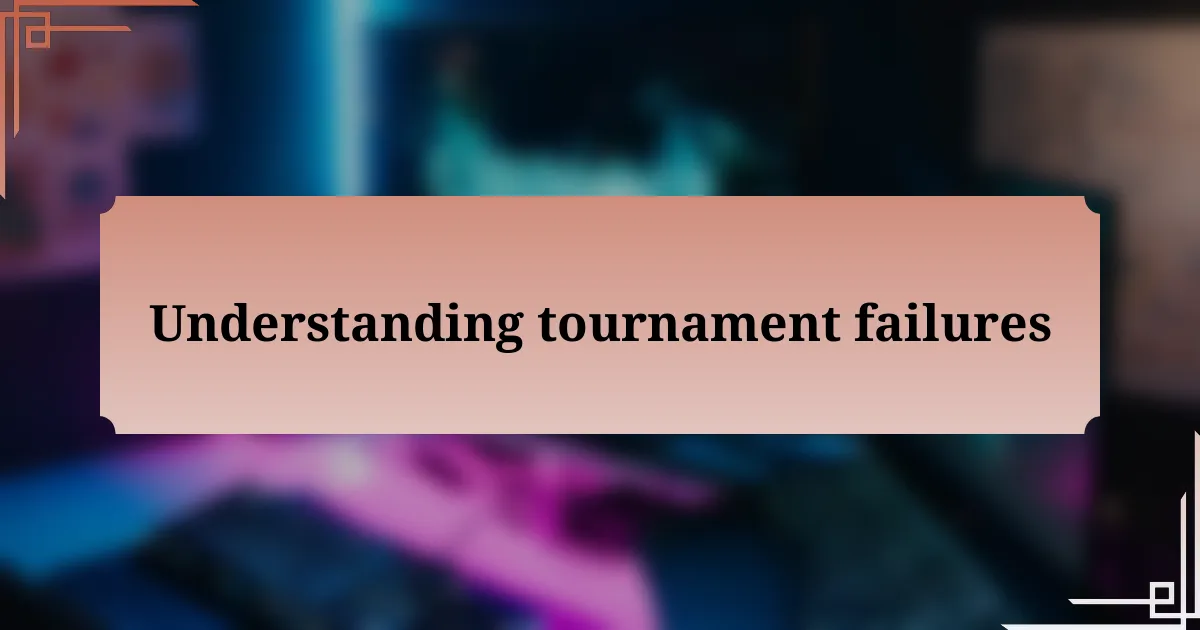
Understanding tournament failures
Tournament failures can be a tough pill to swallow. I remember watching a team I had cheered for stumble in the finals due to miscommunication—a small slip that had massive consequences. It raises a question: How often do we overlook the importance of clear communication under pressure?
Understanding why a team fails in a tournament often requires examining the unseen struggles behind the scenes. For instance, one time, I witnessed a team’s downfall not from a lack of skill, but from separate egos clashing, undermining their synergy. In esports, where milliseconds matter, how much impact can interpersonal dynamics really have?
Moreover, it’s crucial to recognize that tournament failures can illuminate weaknesses in practice routines and strategies. I’ve seen teams needlessly grind away at the same strategies that weren’t yielding results, thinking that sheer effort would turn the tide. Isn’t it fascinating how sometimes stepping back and reassessing can lead to breakthroughs?
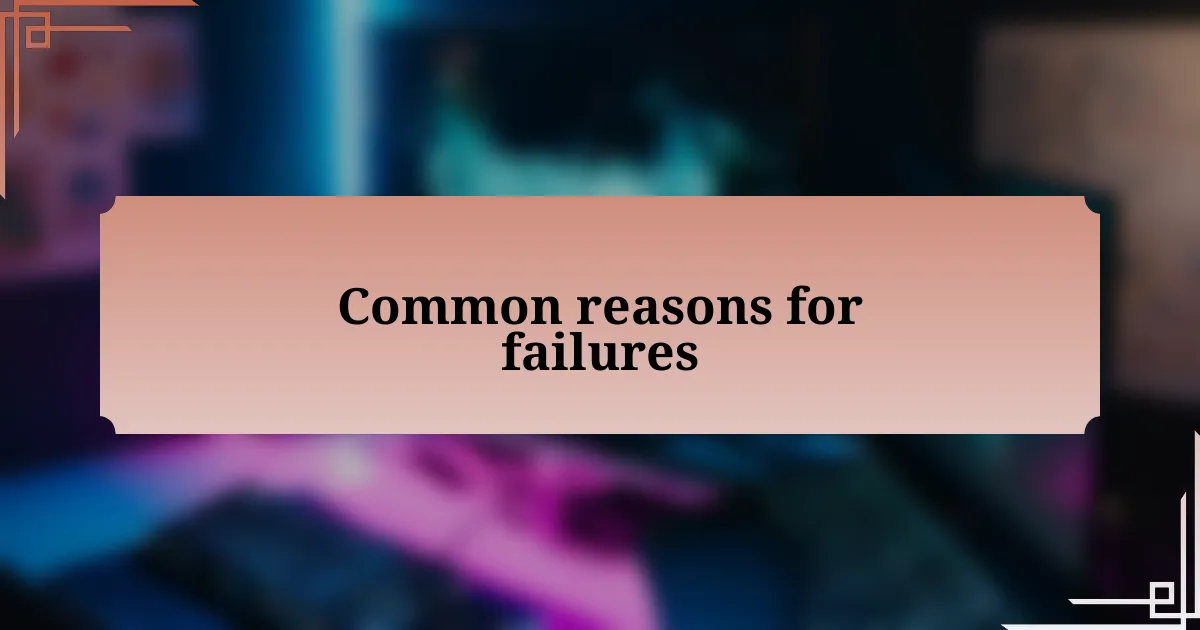
Common reasons for failures
One common reason for failures in tournaments is a lack of adaptability. I once watched a team that excelled in the group stages get completely thrown off when their opponents switched strategies unexpectedly. It made me wonder: how prepared are teams to pivot when their initial game plan falls apart?
Another frequent pitfall is the pressure of high-stakes environments. I recall a moment when a player I admired choked during a crucial match, overwhelmed by the expectations swirling around him. How often do we forget that mental resilience is just as important as mechanical skill in esports?
Finally, underestimating opponents can lead to dire consequences. In one tournament, I saw a well-ranked team dismiss a lesser-known opponent, assuming victory was guaranteed. They quickly learned that every team comes prepared to give their best, and this humbling defeat highlighted the importance of respect and vigilance in competition. Is it fair to assume that talent alone is enough to clinch a win?
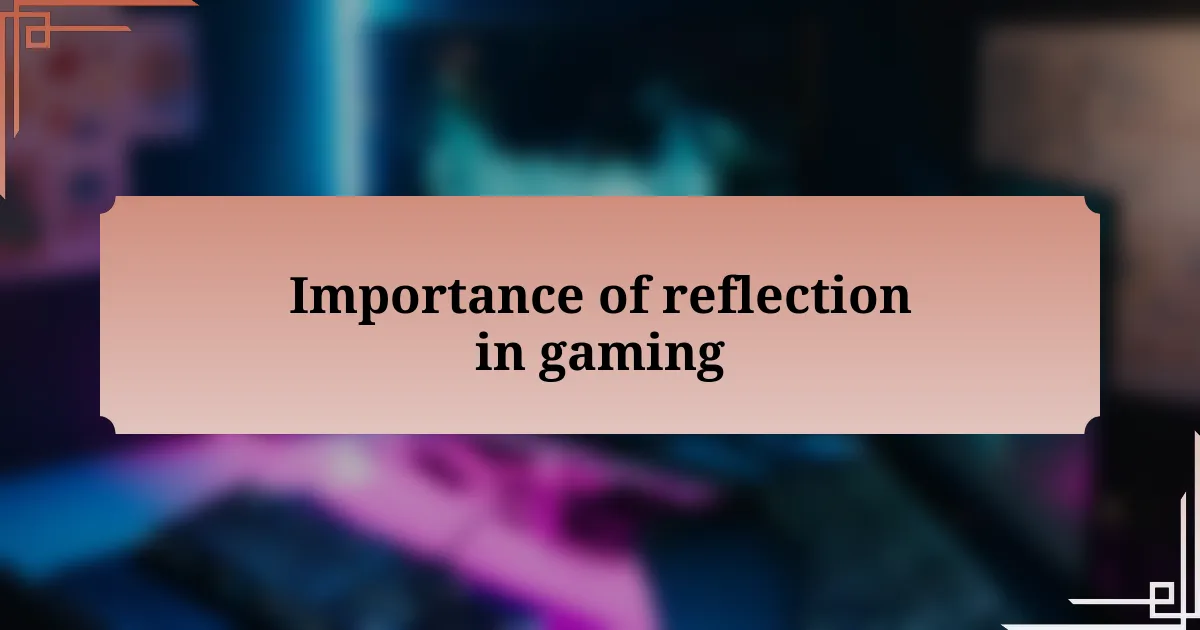
Importance of reflection in gaming
Reflecting on past performances is essential in gaming. I remember a time when my team lost a pivotal match, and instead of just feeling defeated, we held a discussion about what went wrong. It was eye-opening to realize how many small decisions led to that loss, reinforcing the idea that understanding our mistakes can pave the way to improvement.
During my early days in esports, I often brushed off losses as mere bad luck. However, after a particularly crushing defeat, I took the time to analyze every aspect of the gameplay. This process taught me to embrace failures as learning opportunities. Have you ever stopped to consider how a loss can actually reshape your strategy for the better?
Reflection helps players identify patterns over multiple tournaments. Recently, I noticed that certain weaknesses persisted across different matches. By taking the time to reflect, I was able to make specific adjustments to my gameplay, which ultimately strengthened my overall performance. Are we truly utilizing the lessons from our experiences, or are we letting them slip away unnoticed?
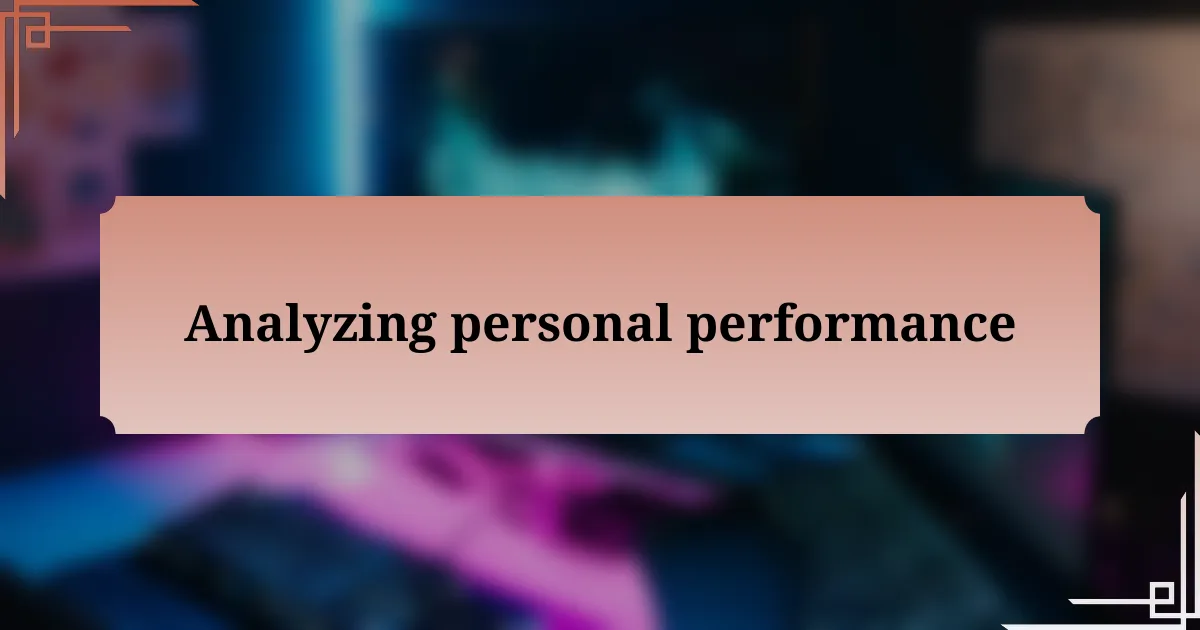
Analyzing personal performance
When I look back at my tournament experiences, I find that the most crucial moment often comes after a loss. One time, my team and I reviewed a particular match where we underestimated our opponents. I remember feeling embarrassed as we pointed out our overconfidence and how it cost us critical plays. This experience was a profound reminder that underestimating any team can lead to unexpected results.
Often, I’ll sit down with my gaming logs, analyzing my individual contributions. It’s striking how simple miscommunications can snowball into significant mistakes. I recall one match where I failed to communicate an enemy’s position, and it led to a chain reaction that ended in a devastating defeat. Have you ever considered how a small lapse in communication can jeopardize your entire game?
Taking time to dissect my strategies has become a habit. After one particular tournament where we fell short, I spent hours reviewing recorded footage. I discovered patterns—certain decisions I made consistently led to unfavorable outcomes. I found myself wondering, are we truly aware of our habits, or are we repeating the same mistakes without conscious thought?
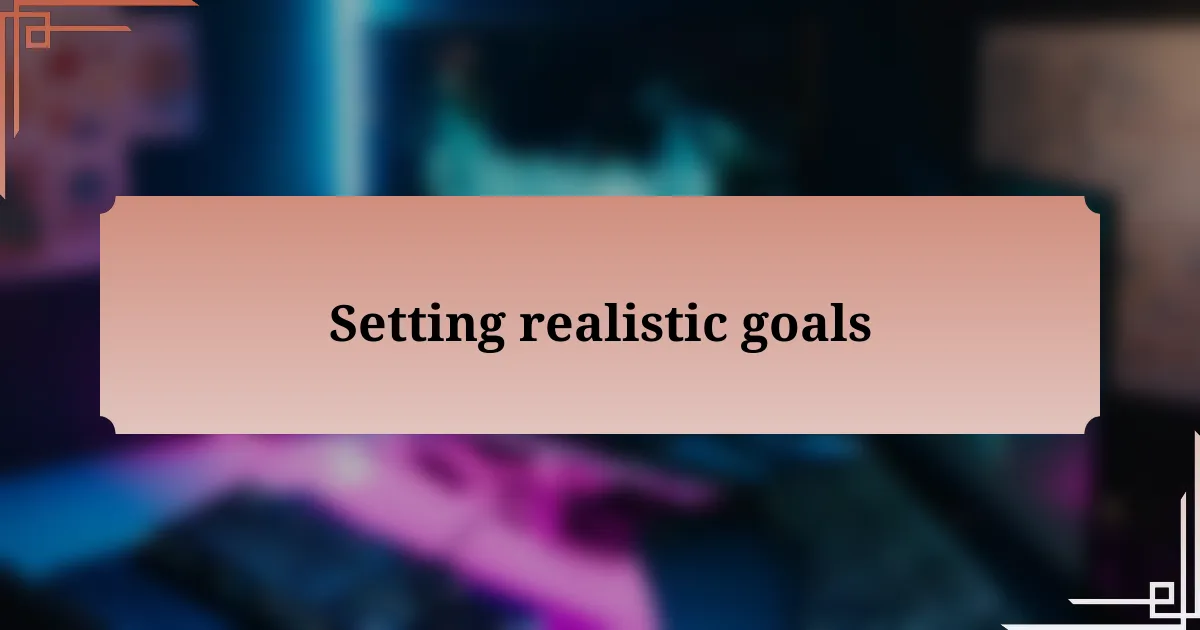
Setting realistic goals
Setting realistic goals is about understanding your capacity and aligning your expectations. I recall entering a tournament with the lofty ambition of winning the championship title, only to realize halfway through that our team dynamics needed more time to gel. The disappointment I felt was palpable; it taught me that sometimes aiming too high without appreciating the current skill level can set you up for failure.
In my experience, breaking down big objectives into smaller, manageable milestones can be incredibly effective. I remember a situation where my goal was to improve my individual rank by a certain number in a month. By focusing on specific areas—like enhancing my aim or mastering a new character—I found incremental improvement that felt much more rewarding. Setting these smaller goals kept my motivation high, and I was able to celebrate each achievement, however minor.
Have you ever thought about the difference between a dream and a goal? I learned that dreams can be inspiring, but goals need clarity. After a grueling tournament, I sat down with my teammates to evaluate whether our objectives were achievable. I noted how our initial enthusiasm turned into frustration, prompting us to reassess our ambitions. By setting practical benchmarks, we set the stage for gradual progress rather than overwhelming ourselves with unattainable expectations.
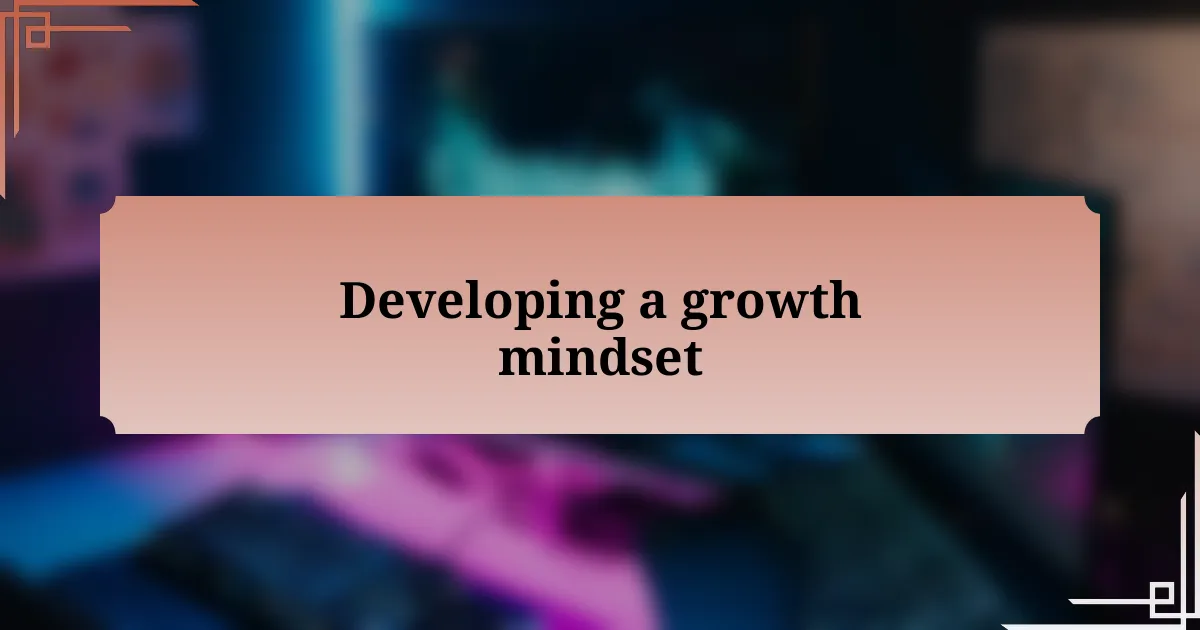
Developing a growth mindset
Developing a growth mindset is essential for anyone facing setbacks in competitive gaming. I remember getting knocked out early in a major tournament, and at that moment, it felt like the end of the road. Instead of wallowing in disappointment, I asked myself, “What can I learn from this experience?” Embracing that question opened up a treasure trove of insights, reminding me that failures could be stepping stones rather than roadblocks.
Have you ever analyzed what went wrong during a tough match? I did this with my team after a particularly brutal defeat. We dissected our gameplay, identifying mistakes and pinpointing areas for improvement. This reflection not only allowed us to strategize better but also fostered a comforting camaraderie among us. We learned that every loss was just an opportunity to grow, which transformed our mindset from one of defeat to a hunger for improvement.
Cultivating a growth mindset invites a refreshing perspective on challenges. I used to view losing as a personal failure, but now I celebrate those moments. It took time, but I gradually learned to approach each setback with curiosity instead of fear. How often do we find ourselves caught up in negativity after setbacks? Instead, I encourage you to reframe your thinking: each tournament can be a valuable lesson, guiding you toward greater success in the future.
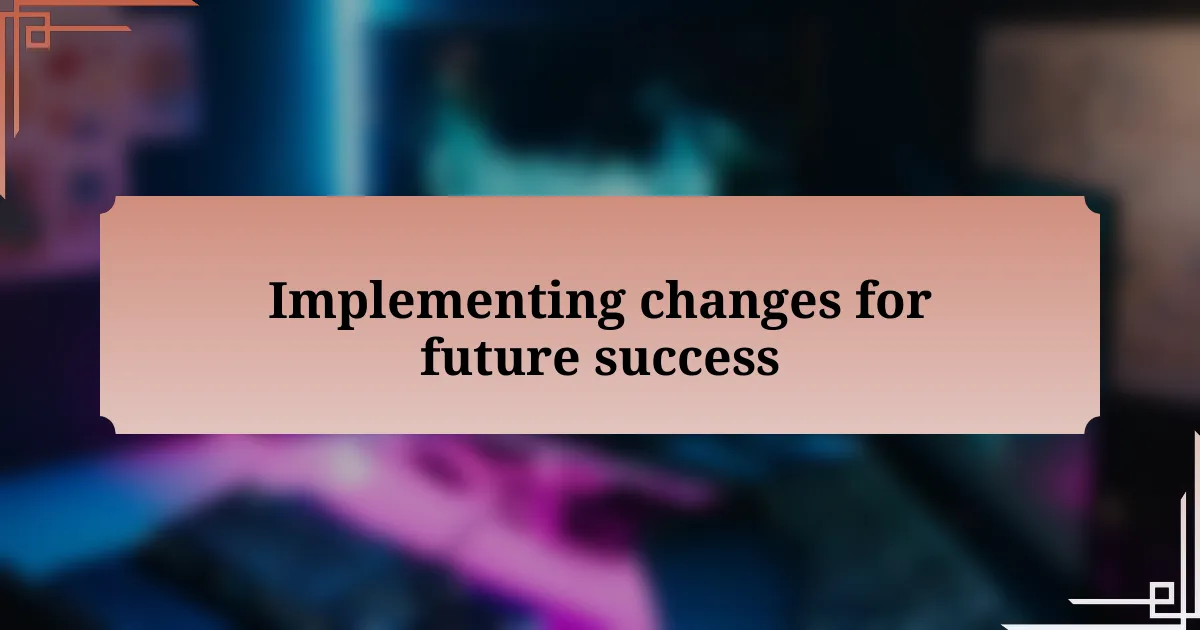
Implementing changes for future success
Implementing changes for future success requires a proactive approach to learning from our past. I remember after a tournament where we underestimated an opponent, I felt an intense mix of regret and determination. It spurred me to suggest regular scrim sessions against teams we perceived as weaker, ultimately sharpening our skills and boosting our confidence in upcoming matches. Have you considered how consistent practice against diverse opponents can help break the cycle of underperformance?
Reflecting on defeats serves as a catalyst for positive transformation. After one major loss, I coordinated a strategy workshop with my team, where we explored innovative tactics that incorporated everyone’s strengths. It wasn’t just about discussing what went wrong; it was about fostering creativity and generating excitement for our next competition. I learned that the more inclusive we are in our planning, the more invested everyone feels in the outcomes. How does fostering a collaborative environment resonate with your experiences in gaming?
Moreover, setting measurable goals can create a clear path towards success. I recall setting small, achievable milestones for our practice sessions, which made our progression tangible. Each time we accomplished a goal, it reignited our motivation and helped us build momentum toward larger objectives. I often ask myself—what if we had the foresight to define success in smaller parts? It could mean the difference between stagnation and meaningful growth.

